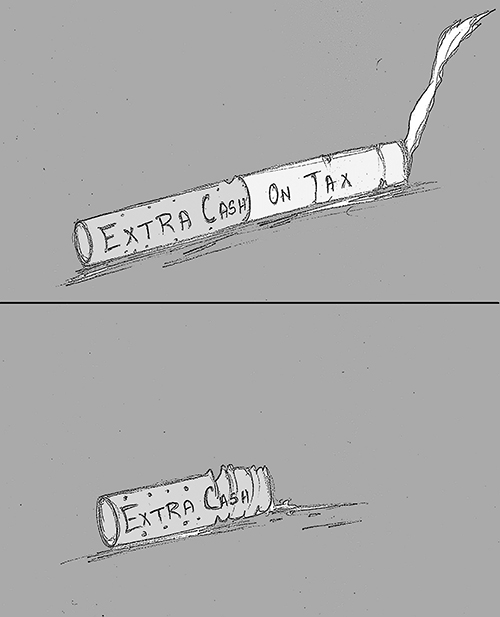Smoking is true freedom: a glorious exhibition of one’s inner dragon, a sexy statement of youthful allure, a luxurious way to hire a hit man for five dollars a day.
Butt tax

Smoking is true freedom: a glorious exhibition of one’s inner dragon, a sexy statement of youthful allure, a luxurious way to hire a hit man for five dollars a day.
Those who are part of the smoking culture are orally and physically bewitched by the temptation and taste of a fresh stick of tobacco. Taking a five-minute break from reality, they inhale their vice and exhale their stress; without remorse they escape the rigorous daily schedules they adhere to while wading through the toilsome tar-pit that is school and work.
This is a hard time for smokers; they are persecuted by way of legal distancing from doors and windows, health-freak smugness and sneers, parents with children in tow diving away from the deadly columns of cancer and clean-air advocates claiming a right to the atmosphere. In the Park Blocks in the middle of Portland State’s campus, however, a completely public domain, smokers can enjoy their freedom and puff away in peace.
But among this subculture there exist a few careless smokers who litter their butts along every walkway they visit and in every open space they inhabit. This litter causes frustration, disgust and harm to the environment and is an eyesore against the lovely natural decor of the Park Blocks.
Because of the butt stigma, smokers are brow-beaten from every angle. Student groups are pushing for a full ban on smoking in the Park Blocks, which would force the large amount of smokers into the tiny nooks and alcoves hidden away from plain sight.
The idea of removing a direct polluting agent isn’t an unreasonable one; however, a large pack of smokers huddling in front of a business or housing facility near the school would cause a ruckus, as well as jeopardize the cohesive relationship between the school and the community around it.
A solution exists.
Along with the use of manageable ash trays—the ones shaped like pawns from a chess set—there should be a 25-cent tax on cigarettes that are sold within a certain radius of the school or even throughout the entire downtown area. Not only would this tax money provide for cleaning up littered cigarette butts, it could help to establish a refund service similar to that used with recyclable cans and bottles.
Many cities have implemented this extra tax on cigarette sales, and applying a refund to the butts would incentivize the proper disposal of cigarettes as well as give all the cracked-out wanderers of the downtown area something to focus on other than asking every passerby for spare change.
Imagine an entire force of volunteers scouring the city for butts that they could trade by the pound for cash. The city would be cleansed of its stinky butts, smokers would think twice about flicking their potential cash refund onto the ground—and maybe they would even be relieved of some of the persecution they presently face.
Cigarette butts don’t decompose because of their toxicity and plastic-based composition. There are some visionaries who believe cigarette butts could be used as a filler in concrete pouring, bricks or other building materials.
Recent discoveries have revealed that cigarette butts can be used to prevent rust and corrosion in steel used by oil companies. In essence, one toxic waste can be used to aid in the transportation and harvesting of another toxic waste, which is a step in the direction of finding a use for butts but is hardly sustainable.
TerraCycle Inc. has found a way to recycle cigarette butts. The company, founded in 2001 by Tom Szaky, has become an innovator in finding ways to recycle (and upcycle) things we’ve traditionally seen as landfill-only waste.
In collaboration with Santa Fe Natural Tobacco Company—the maker of American Spirit cigarettes—TerraCycle’s Cigarette Waste Brigade collects cigarette butts, the cigarette box’s inner foil and plastic wrapping and other cigarette waste. Members of the CWB send their waste to TerraCycle using prepaid shipping labels.
All this “waste” then gets recycled into things like plastic shipping pallets, ashtrays and various other products. Whatever residual tobacco remains goes into tobacco composting.
So, you see, butts don’t have to be an eyesore. We just have to think a little differently.
With Portland considered one of the forerunners of green technology and environmentalism, the city should make an effort to reduce one of the leading forms of pollution that plague the environment. If not for the sake of the Earth, then for the peace of mind of smokers and nonsmokers alike. Then they can stop arguing about open-air cleanliness and personal freedom.
A new tax is one way of handling this butt nuisance, and having the crack-heads and meth freaks clean up the city seems hilariously utilitarian.






